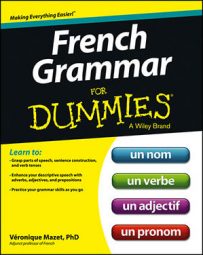The French verbs pouvoir (can/to be able to), vouloir (to want), and devoir (must/to have to) are important because they function as helper verbs in combination with another verb. In that case, the helper verb is conjugated but the other verb is in the infinitive. Here are some examples:
La police veut parler avec le suspect. (The police want to talk to the suspect.)
Tu peux me prêter ta voiture s’il te plait? (Can you lend me your car, please?)
Ils doivent finir leur travail. (They have to finish their work.)
Unless you’re dealing with a past tense like the passé composé (present perfect), you can only have an infinitive after a conjugated verb.
These verbs are irregular because they have two completely different stems: one for the je, tu, il/elle/on, and ils/elles forms and another one for the nous and vous forms. For instance, pouvoir alternates between a peu- stem and a pouv- stem. To form the present for pouvoir, you start with the appropriate stem and add the specific ending for each subject: -x, -x, -t, -ons, -ez, or -vent.
See the complete conjugation of pouvoir in the following table.
| je peux | nous pouvons |
| tu peux | vous pouvez |
| il/elle/on peut | ils/elles peuvent |
Vouloir alternates between a veu- stem for the je, tu, il/elle/on, and ils/elles forms and a voul- stem for the nous and vous forms, with the following endings: -x, -x, -t, -ons, -ez, and -lent. The following table shows the complete conjugation.
| je veux | nous voulons |
| tu veux | vous voulez |
| il/elle/on veut | ils/elles veulent |
Devoir alternates between a doi- stem for the je, tu, il/elle/on, and ils/elles forms and a dev- stem for the nous and vous forms, with the following endings: -s, -s, -t, -ons, -ez, and -vent. The following table shows the complete conjugation.
| je dois | nous devons |
| tu dois | vous devez |
| il/elle/on doit | ils/elles doivent |
The endings for the ils/elles forms include the same consonant as the infinitive: -v for pouvoir, -l for vouloir, and -v for devoir.
Although it’s not a helper verb, boire (to drink) has a a similar double stem irregularity as pouvoir, vouloir, and devoir (it is formed much like devoir), so it makes sense to place it in the same group. To form the present tense of boire, first separate the je, tu, il/elle, and ils/elles forms from the nous and vous forms, like you did for the helper verbs pouvoir, vouloir, and devoir.
For je, tu, il/elle, and ils/elles, drop -re to get the stem boi- and then add the endings you need: -s, -s, -t, or -vent.
For nous and vous, the stem is buv-. Add the ending -ons or -ez to get the corresponding present tense forms.
Here the complete conjugation for boire.
| je bois | nous buvons |
| tu bois | vous buvez |
| il/elle/on boit | ils/elles boivent |
To recall that pouvoir, vouloir, devoir, and boire share a similar irregularity, you can use this little phrase: Je veux et je peux boire mais je ne dois pas (I want to drink, and I can drink, but I must not).

